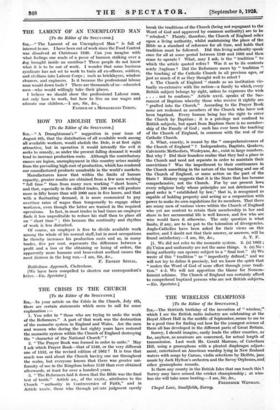HOW TO ABOLISH THE DOLE
[To the Editor of the SPECTATOR.] SIR,—" A Draughtsman's " suggestion in your issue of August 8th, that the distribution of all available work among all available workers, would abolish the Dole, is at first sight attractive, but in operation it would intensify the evil it seeks to remedy, as under the present falling demand it would tend to increase production costs. Although the contributory causes are legion, unemployment in this country arises mainly from the prevailing high cost of production, which has rendered our manufactured products unsaleable in the world's markets.
Manufacturers know that within the limits of human capacity, greater results are obtained from a few men working " full time " than from many men working " short hours," and that, especially in the skilled trades, 100 men will produce more in fifty hours than will 1000 men in five hours, and that with a fluctuating demand, it is more economical to pay overtime rates of wages than temporarily to engage other workmen, even though the latter are trained in the required operations. In fact, in most trades in bad times an employer finds it less unprofitable to reduce his staff than to place all on " short time " ; this because the continuity and rhythm of work is less disturbed.
Of course, an employer is free to divide available work among the whole of his normal staff, but in most occupations he thereby increases his production costs and as, in many trades, five per cent. represents the difference between a profit and a loss or the obtaining or losing of orders, the apparently more humane and benevolent method causes the most distress in the long run.—I am, Sir, &c., [We have been compelled to shorten our correspondent's letter.—En. Spectator.]










































 Previous page
Previous page